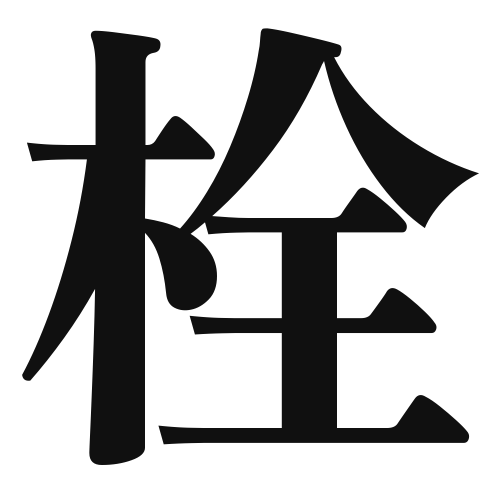1. Overview of Meaning
The kanji “栓” (sen) means “plug” or “stopper.” It refers to an object used to seal or close an opening, such as a bottle or a container, preventing the contents from spilling or being exposed to the air.
2. Formation and Radical
Formation of the Kanji: The kanji “栓” is a compound character (会意文字) that combines elements representing a tree and a tool, symbolizing the idea of a wooden plug or stopper.
Radical: The radical for “栓” is “木” (tree), which indicates its connection to wood, as many stoppers are made from wooden materials.
3. Examples of Usage
Common Words and Phrases: Some frequently used words that include “栓” are:
- 栓抜き (せんぬき, sen-nuki) – bottle opener
- 栓をする (せんをする, sen o suru) – to plug or seal
Example Sentences in Daily Conversation:
- このワインの栓を抜いてください。 (このワインのせんをぬいてください。) – Please open the bottle of this wine.
- お風呂の栓を抜いてお湯を抜きます。 (おふろのせんをぬいておゆをぬきます。) – I will pull the plug from the bathtub to drain the water.
4. Synonyms and Antonyms
Similar Kanji: A similar kanji is “蓋” (ふた, futa), which means “lid” or “cover.” While both can be used to close containers, “栓” specifically refers to a plug that seals an opening, whereas “蓋” refers to a cover that sits on top.
Antonyms: An antonym for “栓” could be “開く” (あく, aku), which means “to open.” This represents the action of removing a plug or stopper.
5. Cultural and Historical Background
Connection to Japanese Culture: In Japanese culture, the act of sealing a container is often associated with preserving freshness, especially in food and drink. The use of “栓” is common in traditional sake bottles and other beverages.
Proverbs and Idioms: There are no widely known proverbs specifically featuring “栓,” but the concept of sealing or closing is often metaphorically used in discussions about keeping secrets or protecting something valuable.
